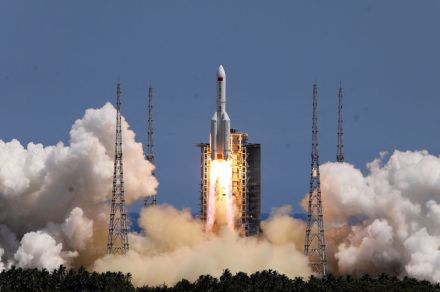
[ad_1]

A Chinese rocket booster has made an uncontrolled re-entry into the environment for the second time this 12 months. Pieces of the booster from a Long March 5B rocket have been confirmed to be making a re-entry by the U.S. Space Command on Friday, November 4, and fell into the Pacific Ocean. It was lucky that the booster fell into the ocean and did no injury, as observers have been anxious that it may have hit a variety of areas from Northern and Central America to Africa or Australia.
Debris from a earlier Long March 5B rocket made an uncontrolled descent in July this 12 months, with some particles reportedly touchdown near villages in Malaysia and Indonesia, however no reviews of accidents have been filed. This time, the booster was from a rocket used to launch the third module of China’s new house station on October 31.
The hazard of permitting rocket elements to fall uncontrolled by means of the environment has been condemned by NASA officers as an pointless danger. “It is critical that all spacefaring nations are responsible and transparent in their space activities and follow established best practices, especially, for the uncontrolled re-entry of a large rocket body debris — debris that could very well result in major damage or loss of life,” NASA Administrator Bill Nelson mentioned, as reported by the New York Times.
The Long March 5B rocket is designed to permit its first-stage booster to make an uncontrolled re-entry, which Chinese officers declare is secure, as most parts expend within the environment. However, specialists say that it’s irresponsible and harmful to permit these uncontrolled descents to go forward.
“Today’s uncontrolled #LongMarch5B re-entry underlines the growing risk for critical infrastructure both in space & on the ground posed by unsustainable spaceflight practices,” European Space Agency Director General Josef Aschbacher wrote on Twitter. “In the past decade, about 100 pieces of large debris have re-entered the atmosphere each year, with a total annual mass of about 150 metric tons. We must work on technology to better track and predict and mitigate satellites and rocket bodies heading for uncontrolled re-entries.”
As a results of the falling particles, Spain needed to briefly shut elements of its airspace because the particles handed by means of, Reuters reviews.
Editors’ Recommendations
[ad_2]